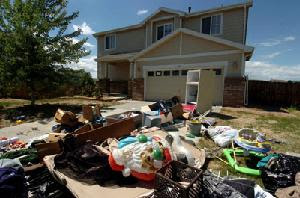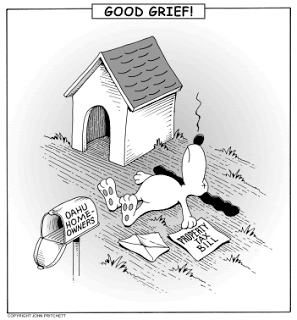The Bubble Collapses, The Police State Expands (Quick Update)

Evicted: Abandoned personal effects were piled on the lawn of this foreclosed home in Colorado’s Adams County. The Sheriff’s Department emptied the house and changed the locks.
With the Dow peaking above 13,000, the most observers direct their gaze skyward as they wonder how much higher the market can climb. Few are taking the time to examine the market’s decayed and crumbling foundation, as they wonder how soon the structure will collapse.
The market is not built on rock or even on sand, but rather perched precariously atop the housing/mortgage/refinancing bubble the Federal Reserve so diligently inflated during the first half of the decade. Wall Street’s necromancers have transmuted debt into “wealth” by creating exotic financing mechanisms to encourage mortgage lending to dubiously qualified – or entirely unqualified – home buyers, and then securitizing those loans for investors. This scam – like many others — works fine as long as the housing bubble continues to expand.
Now that the bubble has burst, defaults and foreclosures on “sub-prime” mortgages are mounting. Hundreds of thousands of families have lost their homes; neighborhoods and communities are being ravaged; and municipal governments face what could be called “gentrification in reverse” — the creation of vacant, deteriorating urban areas that become magnets for crime.
The last to suffer will be those who most richly deserve to – the Fed-allied financial interests who have facilitated the entire scam by luring people into unmanageable debt.
In Cleveland, reported the New York Times on March 23, “Hundreds of houses are vacant because they are caught in legal limbo, have been abandoned by distant banks or the owners cannot find buyers.” In suburban Euclid “more than 600 houses have gone through foreclosure or started the process, many of them the homes of elderly people who refinanced with low two-year teaser rates, then saw their payments grow by 50 percent or more.”
Euclid’s city government, which claims an annual property tax shortfall of $750,000 from the vacant houses, has hired new building inspectors and has taken out a $1 million loan to pay for “rehabilitation, demolition, and lawn care at the foreclosed houses.” The city anticipates recovering those costs through tax assessments when the renovated buildings are sold.
What if, in an ever-softening real estate market, they don’t sell?
Well … the one constant here, from the municipal government’s perspective, is the need for more revenue. So homeowners who have kept up with their mortgages, or own their homes outright (as opposed to renting them from the bank, which is what a mortgage amounts to), will see their taxes go up – dramatically, I’ll bet.

“To get a tax cut,” comments Dan Goodwin, a tax assessor for California’s Ventura County, “you have to buy a home at the peak and have it lose value quickly. You can’t enjoy double-digit increases in you home value and then expect a tax cut when the market dips.”
Well, why not? With household budgets already under stress from increases in non-discretionary spending – food, energy, and housing – why can’t county governments bite the bullet and take in a little less?
There are countless ways to answer that question, but they can all be easily digested into this simple proposition: County governments have constituencies to feed, and they have Sheriff’s Departments to command.
So you pay what they tell you to pay, or wind up like the Sundsmos.
A rising tide lifts all boats, and (to alter the metaphor) a collapsing nation-wide real estate bubble is likely to drag everybody down – beginning with those who are trying to get out of mortgages they can’t afford to pay.
As an earlier USA Today story pointed out, foreclosures on sub-prime mortgages depress housing values in entire neighborhoods. “Why pay full price for my house when you can pick up a foreclosure for $30,000 or $40,000 less?” asks Dannice Clark, a postal worker from Atlanta who is trying to sell her home.
Among those who are seeing their equity evaporate, warns Dan Immergluck of the Georgia Institute of Technology, are homeowners who qualified for interest-only mortgages, which are poised to re-set. “I’m concerned that could really tip some of these middle- and upper-income neighborhoods, in terms of high foreclosure rates,” Immergluck warns.
In Georgia’ Gwinett County, as in Ohio, Michigan, and elsewhere, many abandoned homes have been neglected by the banks or other lending institutions that own them. Some of them quickly fall prey to vandalism, or attract squatters. This, in turn, leads to an increased police presence, often carried out by “Quality Of Life” (QOL) units, who are tasked to enforce building codes and ordinances dealing with graffiti and vagrancy.
The creation of QOL patrols was inspired by the “broken window” premise — that is, a broken window, littered sidewalk, or unattended home “sends a signal” that a neighborhood is fair game for reprobates. One commentator summarizes that theory thus: “[T]he smallest symptoms of antisocial behavior will, left to fester, breed greater and greater crimes, all the way down to murder.”
While there may be some merit to that theory, in practice — as in New York City under the reign of Il Duce Giuliani — “quality of life” policing has sometimes led to replacing the anarchic violence of street criminals (or merely the unsightly spectacle of street beggars) with state-sanctioned violence — such as the unpunished murder of private security guard Patrick Dorismond by undercover New York narcotics officers.
(Dorismond, the father of two, was accosted by the officers, who asked where they could buy drugs. He took offense, and a scuffle ensued in which Dorismond was fatally shot in the chest. As public outrage mounted over this needless death, Giuliani illegally unsealed Dorismond’s juvenile delinquency record, and released a toxicology report showing that the victim had smoked marijuana shortly before he was killed — none of which has anything to do with his summary execution at the hands of police who, according to eyewitnesses, provoked the fight and then spat profane invective at the young father as his life bled away.)
Taken in the abstract, QOL-oriented policing seems like a good idea, if only because it addresses the age-old complaint that there’s never a policeman around when you need one. The problem, once again, is found in the practice, rather than the principle. In practice, QOL policing means the ever-increasing presence of armed government agents in the employ of revenue-starved governments, there to enforce often obscure ordinances regulating how you cut your grass, care for your lawn, paint your house, maintain your car, and even feed your dog. And intrusions of this sort can now be justified as a way of helping to keep property values up in your neighborhood — as if anything you can do would have a bigger impact than the Fed’s manipulation of the money supply.
In prosperous and stable times, this is a formula for trouble. What happens when the prosperity (or at least the illusion of the same) is gone?
Think of it this way: Quality of Life policing is a creative way of weaving armed agents of the state into the fabric of a community, just as the unwinding of the housing/mortgage/refinancing market causes that social fabric to become undone.
Video extra:
In this clip from Boston Legal, Alan Shore — the high-viscosity uber-lawyer played by James Spader — peels the skin off an attorney representing the credit card industry. Shore’s soliloquy is filed under “Things I Wish I Had Written,” and, in fact, it does remind me a great deal of at least one essay I did write.
Make sure to visit The Right Source.
Content retrieved from: http://freedominourtime.blogspot.com/2007/04/bubble-collapses-police-state-expands.html.




























